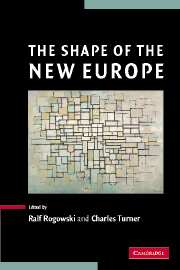Book contents
- Frontmatter
- Contents
- List of Contributors
- Acknowledgements
- 1 Europe: Law, Politics, History, Culture
- Part I Constitutionality and Political Participation
- Part II European Polity and European Civil Society
- Part III European History and European Culture
- 6 Plaidoyer pour l'Europe des Patries
- 7 Europe Becoming: The Civilisational Consequences of Enlargement
- 8 Gaia and Europa: Religion and Legitimation Crisis in the ‘New Europe’
- 9 A Postnational Council of Isles? The British–Irish Conflict Reconsidered
- Part IV Europe and The World
- Index
- References
9 - A Postnational Council of Isles? The British–Irish Conflict Reconsidered
Published online by Cambridge University Press: 22 September 2009
- Frontmatter
- Contents
- List of Contributors
- Acknowledgements
- 1 Europe: Law, Politics, History, Culture
- Part I Constitutionality and Political Participation
- Part II European Polity and European Civil Society
- Part III European History and European Culture
- 6 Plaidoyer pour l'Europe des Patries
- 7 Europe Becoming: The Civilisational Consequences of Enlargement
- 8 Gaia and Europa: Religion and Legitimation Crisis in the ‘New Europe’
- 9 A Postnational Council of Isles? The British–Irish Conflict Reconsidered
- Part IV Europe and The World
- Index
- References
Summary
In the third millennium, postnationalism looks set to replace nationalism as the dominant political paradigm. The twentieth century witnessed the break-up of the great national empires – British, French, Austro-Hungarian, Ottoman, Russian – as well as a number of devastating world wars resulting from the internecine rivalries between nation-states. The terminal death-rattles of nationalist belligerence (on the European scene at any rate) sounded on the streets of Belfast where republicans and loyalists fought their last battles before finally reaching peace in 1998, and in the villages of Croatia, Bosnia and Kosovo where Balkan ethnicities clashed in genocidal hatred before an international accord was secured. Widening the focus, the events of 11 September 2001 made it dramatically clear that wars of the twenty-first century cannot be confined to specific nation-states, or national empires, but traverse boundaries and borders with disturbing ease. Al-Queda is as postnationalist as the American Way of Life it targets.
In several writings over the last two decades, the German philosopher, Jürgen Habermas, argues for what he calls a ‘postnational constellation’ as a response to the current political situation in Europe. Noting the erosion of the territorial sovereignty of nation-states, Habermas expresses the hope that this may open up a new space for: (1) cultural hybridisation; (2) transnational mobility and emigration; (3) cosmopolitan solidarity, predicated on a neo-republican balance between private and civic liberties opposed to the neo-liberal disregard for social justice; and (4) constitutional patriotism (on a federal European scale inspired by principles of coordinated redistribution and egalitarian universalism).
- Type
- Chapter
- Information
- The Shape of the New Europe , pp. 167 - 184Publisher: Cambridge University PressPrint publication year: 2006

